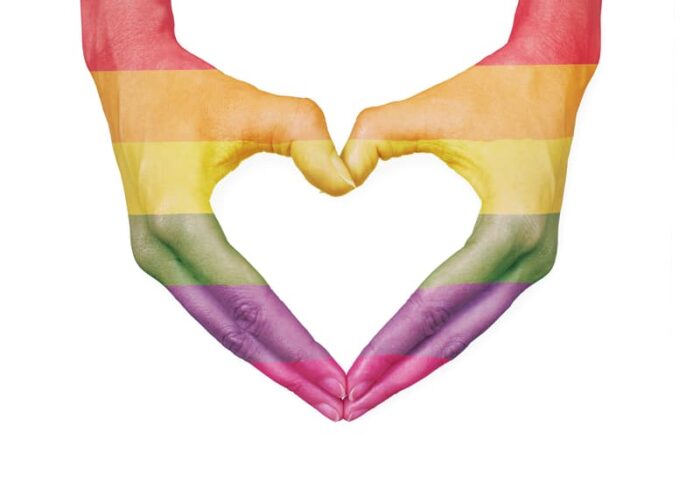- Calls to this hotline are currently being directed to Within Health or Eating Disorder Solutions
- Representatives are standing by 24/7 to help answer your questions
- All calls are confidential and HIPAA compliant
- There is no obligation or cost to call
- Eating Disorder Hope does not receive any commissions or fees dependent upon which provider you select
- Additional treatment providers are located on our directory or samhsa.gov
Advice on How to Speak to a Member of the LGBTQ+ Community About an Eating Disorder

Individuals in marginalized groups have an increased likelihood of mental health diagnoses, including eating disorders. For the LGBTQ+ community, this is apparent, with an estimated 40 to 70% of LGBTQ+ individuals experiencing an eating disorder in their lifetime [1].
Individuals that identify as LGBTQ+ experiencing unique stressors that likely contribute to these numbers and these experiences should be considered if you are approaching a loved one in the LGBTQ+ community about their disordered behaviors.
It is important to note that I, the writer, am not a member of the LGBTQ+ community. I am an eating disorder therapist that has worked in the advocacy and treatment community for almost 10 years. Any insight and suggestions in this piece, therefore, are from my own professional experience having treated individuals in the LGBTQ+ community struggling with eating disorders.
Ultimately, if you are unsure of how to approach a loved one in the LGBTQ+ community about their eating disorder, never be afraid to simply ask them how you can provide support and make a concerted effort to listen.
Call Eating Disorder Solutions for Help 855-783-2519
Consider Their Perspective
Ultimately, when approaching a loved one in the LGBTQ+ community about their eating disorder behaviors, recognize that providing support is more about listening than you doing the talking. How an individual that identifies as LGBTQ+ experiences the world can be unique.
The Minority Stress Model considers this and “posit(s) that individuals from LGBT populations experience unique distal stressors, such as stigma and discrimination, and proximal stressors, such as internalized homophobia or transphobia and concealment of sexual or gender identity which in turn lead to increased risk for the development of physical and mental health issues [2].”
In relation to eating disorder development, “individuals from sexual and gender minority groups that perceive higher levels of stigma are more likely to report eating disorder symptoms” and “shame, concealment of one’s sexual identity, and discrimination increases the risk of eating disorders in sexual minority men and women [2].”
Over all, “clinical eating disorders and eating disorder behaviors occur more frequently in LGBT individuals compared to their heterosexual and cisgender counterparts [2].” All of this solidifies what many LGBTQ+ identifying individuals understand through their lived experience – that the stress placed on an individual due to stigma and discrimination has a harmful and negative impact on mental health.
Recognize that, just by walking through the world as an individual that identifies as LGBTQ+, your loved one is likely experiencing the world differently than you.
Let Them Tell You Their Experience
It is important to consider the above aspects of the LGBTQ+ experience as a foundational understanding, but do not assume this means that you “understand” or fill-in-the-blanks of your loved one’s story with assumptions. It is wonderful to inform and educate yourself, however, no research article will share with you how any individual thinks or feels. When approaching your loved one, be open in letting them tell you about their eating disorder.
Maybe their LGBTQ+ identification has impacted their disordered beliefs or behaviors, however, it is also possible it has not. Not everything that impacts an LGBTQ+ identifying individual has to do with their sexual or gender identity. Empower your loved one by acknowledging that there are things you cannot know about their experience and letting them tell you.
Support Without Pushing
Recognize that you can inform yourself and approach your loved one in a supportive and appropriate manner and they can still decide not to share with you. They do not owe you an explanation of their experience and it is okay if they don’t feel comfortable opening up to you about their eating disorder, mental health, or LGBTQ+ identity.
Many individuals in the LGBTQ+ community have experienced horrific and traumatizing stigma and discrimination that has left them isolated. Hopefully, they find a community of people that understand and support them just as they are, which many refer to as their “chosen family.” These bonds are precious, as they exemplify what many of these individuals may not have had – unconditional support of them being exactly who they are.
You do not have a right to enter this circle simply because you want to. This does not mean your loved one isn’t trusting of you or does not want your support. Let them choose what they are comfortable with that support looking like. Ultimately, the most valuable tools in approaching a loved one in the LGBTQ+ community about their eating disorder are kindness, non-judgment, empathy, humility, and love. Leading with these traits will allow you to be open to hearing your loved one’s story and how you can help.
References:
[1] Mensinger, J. L. et al. (2020). Sexual and gender minority individuals report higher rates of abuse and more severe eating disorder symptoms than cisgender heterosexual individuals at admission to eating disorder treatment. International Journal of Eating Disorders, 53:4, 541-554. [2] Parker, L. L., Harriger, J. A. (2020). Eating disorders and disordered eating behaviors in the LGBT population: a review of the literature. Journal of Eating Disorders, 8:51.About Our Sponsor:
 At Eating Disorder Solutions, compassion is at the root of everything we do. We understand that eating disorders are complex, deeply rooted mental health and medical conditions which require personalized treatment for a successful recovery. By integrating behavioral health modalities and clinical interventions, we endeavor to address disordered eating at its source.
At Eating Disorder Solutions, compassion is at the root of everything we do. We understand that eating disorders are complex, deeply rooted mental health and medical conditions which require personalized treatment for a successful recovery. By integrating behavioral health modalities and clinical interventions, we endeavor to address disordered eating at its source.
The opinions and views of our guest contributors are shared to provide a broad perspective on eating disorders. These are not necessarily the views of Eating Disorder Hope, but an effort to offer a discussion of various issues by different concerned individuals.
We at Eating Disorder Hope understand that eating disorders result from a combination of environmental and genetic factors. If you or a loved one are suffering from an eating disorder, please know that there is hope for you, and seek immediate professional help.
Published June 30, 2020, on EatingDisorderHope.com
Reviewed & Approved on June 30, 2020, by Jacquelyn Ekern MS, LPC


